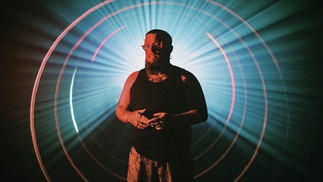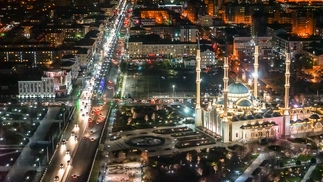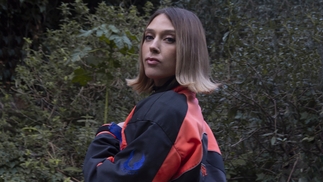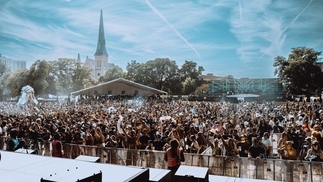Recognise: Zozo
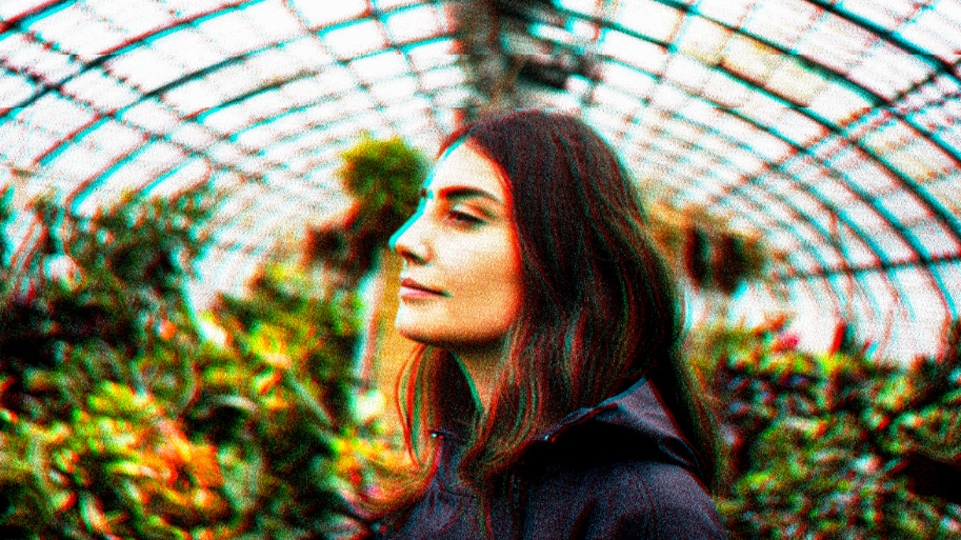
Recognise is DJ Mag’s monthly mix series, introducing artists we love that are bursting onto the global electronic music scene. This month, we speak to Zozo, Istanbul’s purveyor of rhythmic psychedelia and “space drama”...
Zozo’s approach to music is both earthy and otherworldly, organic and encyclopedic, political and hopeful. Standing at the core of Istanbul’s electronic music circuit for close to two decades now, the DJ/producer – real name Nigar Zeynep – started clubbing as a teenager in the late ‘90s in a time where the rave was a central part of Turkey’s youth culture. Since, amid an atmosphere of increased conservatism and political unrest, she has become a vital figure in the local scene herself both as a selector and curator. Known for psychedelic, otherworldly sets of darkened and deep EBM and complex, melodic techno in local venues like Wake Up Call, Mini Müzikhol, Suma Beach, Gizli Bahçe and more, Zeynep’s influence on Istanbul’s underground is palpable at every turn.
The past couple of years have seen that influence spread outside of her native Turkey. As a member of Lyon based collective Macadam Mambo as well as holding down a residency at Berlin’s Sameheads parties, she has recently gone on to play iconic clubs like Berghain’s Panorama Bar, Concrete, Bassiani and ://about blank.
2018, as she explains to DJ Mag, was “like a roller coaster”, which saw her playing both editions of Dekmantel, Mareseille’s Le Laboratoire des Possibles, Melbourne’s Animal Dancing Festival, Flow Festival and Waking Life – “The most lovely, arty and romantic festival I have ever been to" – to name but a few.
Reflecting on Zozo’s near lifelong electronic music upbringing though, it’s no surprise that her dedication and passion for the art of DJing has brought her to where she is today.
“My first encounter to electronic music was through MTV and movies,” she remembers. “Especially Trainspotting when I was a teen. But I cannot skip this vivid memory; I was about eight or nine. I heard Moon Ray’s ‘Comanchero’ in a Turkish movie. It was a summer disco scene. But as a teenager, I was infected in a great way by Leftfield’s ‘Rhythm And Stealth, Underworld, Aphex Twin, Prodigy, Orbital, Brian Eno, Chemical Brothers, Daft Punk’s ‘Homework!’, Massive Attack, Adam F etc.”

From there, she visited events like J&B Techno Festival in 1998 and the 150-capacity Godet Club (which would later become Wake Up Call). A rave outside Istanbul organised by the Godet crew gave her a taste of dance music’s rebellious edge while she would soon discover club anthems from Turkish artists Gökhan Kırdar, Tuğçe San and Ahmet.
When it comes to Turkish music, global perception tends to naively focus on the enduring influence of psyche and Anadolu/Anatolian pop artists like Erkut Taçkın, Selda and Moğollar. When considering the transportive nature of her own DJ sets though, Zeynep does not dwell much on the implied influence of geographical heritage, considering it more as a filter through which her musical and worldly outlook has developed rather than as a definitive style guide.
“As a DJ from Istanbul, I might be perceived as a representative of some kind of mystical, eastern scene,” she explains. “This is also emphasized in the flyers or the names of events that I am part of sometimes. I’m talking about this graphic language reminiscent of Ottoman miniatures or event names like Orient Express or something. In the end, I consider myself as a citizen of a world which is constantly evolving. I usually don’t stick to a certain era or style and I try to keep myself updated with this constant evolution.”
“It might even be expected from an underground DJ or musician hailing from Turkey to have this psychedelic edge... as it is the usual image of this country in the west,” she adds. “Of course Turkish psych or Anatolian pop are strong influences for many of us, but if you spend a few nights in İstanbul underground scene, you might be surprised with the music you are going to be exposed to. Usually, it is the modern dance music you would hear in other European cities.”
With all that said, Zeynep’s comprehensive understanding of Turkish music’s position in history does find her acknowledging the innate influence of traditional sounds on the country’s electronic underground, even if it is not as blatant as people in the west would assume it to be.
“Geographically Turkey has a special location like an intersection point,” she explains. “Throughout history, this region has always been an important trades route. That naturally brings a fusion of cultures. Different styles like Turkish arts music, folk music and Sufi music have all had strong influences in our musical culture. With the modernization of Turkey, classical western music was added to this. I wouldn’t want to bore you with a history lesson about Turkish music covering topics like rembetiko, the rise of arabesque in the ‘80s or the evolution of Turkish pop, but these have all their role in our musical heritage I guess.”
“Personally. the strongest local influences for me were Turkish arts music and folk music,” she adds. “My mother used to be a Turkish arts music singer. She was both a radio artist and a regular stage performer. Naturally, I was exposed to a lot of these kinds of music in my childhood. There was also no escape from pop and Arabesque for a child growing up in the ‘80s and ‘90s. In my sets, I don’t try to emphasise all these, but I kindly embrace these influences so I think they kind of pop up naturally.”

Looking at the present though, there is a thriving underground of musicians, labels, collectives and arts groups across all genres and stylistic media that Zeynep passionately describes as being crucial to Turkey’s bustling scene.
“[There is] Havantepe,” she says. “He’s very classy techno producer. Young talents include Arketip (Salih Topuz), Fluctosa, Robogeisha and Osilator. Beton Orman, In The Void, Bant Mag and Zattirizat are important collectives and magazines which feature so many talented local artists from music and art scene, I think. Some labels include Shalgam, Mustesna and Zelzele records.
“Koray Kantarcıoğlu is an interdisciplinary artist who creates sounds and images I really like,” she adds.
“Emin is the most open-minded DJ I’ve ever been listening. He’s been playing in the local scene for more than 20 years. He’s underrated but I guess he needs to play more! Gorkem Sen’s music is also very impressive! Yaybahar can play the wires out of hearts - at least mine.”
And it is the likes of those musicians and collectives that Zeynep sees as more important than ever in Turkey, where growing political tensions and an increasingly conservative government have made hopeful artistic rebellion a necessity for youth culture and morale.
“If I can’t dance it’s not my revolution!” she says. “Political unrest and conservatism bring some kind of isolation to the people living in Turkey. I don’t know if underground culture is capable of any direct response to this atmosphere, while over 150 journalists are behind the bars or hundreds of academics are tried because of signing a peace declaration. But even keeping on doing events and bringing artists to them is good, at least to break this isolation. Suma Beach, WUC, Gizli Bahce, Arkaoda, Peyote, Minimuzikhol and some other venues are places where people in İstanbul can experience some freedom, express themselves to some extent and retain hope.”
That form of small rebellion through freedom of expression is not anything new in Turkey, Zeynep explains. Up to 1992, all radio broadcasting was under government control. It was later that year, when private broadcasting became legal, that countless stations appeared through the country, the significance of which could not be understated.
“It was a great medium for ordinary people to express themselves,” Zeynep explains. “Imagine you only have five radio channels controlled by the state. All of their content, even the lyrics of the songs are evaluated and controlled by a committee. Everyone on the radio is talking with a perfect tone and dialect all the time. And one day dozens of private radio stations get on-air. You start to hear ordinary people talking about ordinary stuff... And also some unordinary people of course! People started to resonate with this. Just because it was real. Real people, real concerns, real issues...”
“Kent FM, on which the show Kaybedenler Kulübü was being aired is closed now,” she adds. “But some of the radio stations that started their operations back then are still with us. The most significant of them is Açık Radyo, which means ‘open radio’ in Turkish. They have a very open and wide-ranging broadcasting policy and mostly volunteer co-workers consisting of academics, students, intellectuals, musicians, artists, business people, etc. This station is mostly funded by its listeners’ donations.”

A passionate and fiercely conscientious artist then, Zozo’s tireless work and determination extend far beyond just DJing. But that’s not to say 2019 is shaping up to be another pretty big year for her in that regard. With a Rinse FM residency commencing in February, party curations with Sameheads (with Nosedrip and Woody 92 coming up next) and more gigs of her own, the future is wide open for her. However, the main goal is to not overload herself and to ensure that she makes more than enough time to look after her personal life.
“The main goal is to get happier, healthier and wiser and simplify my life,” she says. “Embracing more music, movies, books and my real 'beloved' ones.”
For her DJ Mag Recognise mix, Zozo has delivered an hour of music she simply describes as “space drama”. Rhythmic, deep and enthralling, we couldn't describe it any better.
“I recommend you to enjoy it while travelling or embracing your emotions, dissolving in space. But feel free to do whatever you want to do.”
She has also suggested you look at these GIFS while you listen. Here’s one. And here’s another.
